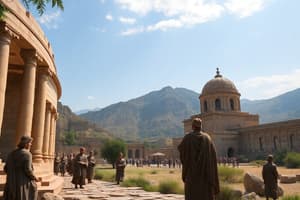Podcast
Questions and Answers
What defines the era of Prehistory?
What defines the era of Prehistory?
- The development of complex civilizations.
- The rise of written records.
- The time before written records. (correct)
- The inception of democracy.
Which civilizations are primarily associated with Ancient History?
Which civilizations are primarily associated with Ancient History?
- Roman Empire, Greek City-States, and Viking tribes.
- Mesopotamia, Ancient Egypt, Indus Valley, and China. (correct)
- Byzantine Empire, Persian Empire, and Samurais.
- Native American tribes and Celtic cultures.
What was a major characteristic of the Middle Ages?
What was a major characteristic of the Middle Ages?
- The establishment of democracy.
- The spread of feudalism and Christianity. (correct)
- The cultural revival in arts and sciences.
- The rise of the Roman Empire.
During which period did the Renaissance occur?
During which period did the Renaissance occur?
What are primary sources in historical research?
What are primary sources in historical research?
Which aspect is crucial for understanding historical events?
Which aspect is crucial for understanding historical events?
Who was Confucius?
Who was Confucius?
What lesson can be learned from studying cycles of empires?
What lesson can be learned from studying cycles of empires?
Flashcards are hidden until you start studying
Study Notes
Key Concepts in History
- Definition of History: Study of past events, societies, and cultures, focusing on human activities over time.
Major Historical Periods
-
Prehistory:
- Time before written records.
- Includes the Stone Age, Bronze Age, and Iron Age.
-
Ancient History:
- Development of writing and early civilizations.
- Key civilizations: Mesopotamia, Ancient Egypt, Indus Valley, and China.
-
Classical Antiquity:
- Rise of empires (e.g., Roman Empire, Greek City-States).
- Development of philosophy, democracy, and trade.
-
Middle Ages:
- Time between fall of Rome and the Renaissance.
- Feudalism, the spread of Christianity, and Islamic caliphates.
-
Renaissance:
- Cultural revival in Europe (14th to 17th century).
- Advancements in art, science, and literature.
-
Modern History:
- Industrial Revolution and the rise of nation-states.
- Significant events: World Wars, decolonization, Cold War.
Sources of Historical Knowledge
- Primary Sources: Firsthand accounts (letters, diaries, official documents, artifacts).
- Secondary Sources: Interpretations and analyses based on primary sources (books, articles).
Importance of Studying History
- Understanding societal development and cultural evolution.
- Learning from past mistakes to inform current decisions.
- Recognizing diverse perspectives and experiences.
Notable Historical Figures
- Julius Caesar: Roman military leader and politician.
- Cleopatra: Last active ruler of the Ptolemaic Kingdom of Egypt.
- Confucius: Chinese philosopher whose teachings impacted East Asian culture.
- Genghis Khan: Founder of the Mongol Empire; significant for unifying Asia.
Historical Methodology
- Chronological Analysis: Understanding events in time sequence.
- Comparative History: Examining similarities and differences across time and place.
- Cultural History: Exploring everyday life, ideas, and cultural norms of societies.
Key Concepts in Historical Interpretation
- Bias: Recognizing the impact of the historian's perspective on interpretation.
- Context: Understanding events within the social, political, and economic conditions of the time.
- Causation: Analyzing factors that led to historical events.
Lessons from History
- Cycles of rise and fall in empires and regimes.
- The impact of technological advancements on society.
- The role of trade and economics in shaping civilizations.
Definition of History
- The study of events, societies, and cultures from the past, with a focus on human activities over time.
Major Historical Periods
Prehistory
- Period before written records, including the Stone Age, Bronze Age, and Iron Age.
Ancient History
- Marked by the development of writing and the emergence of early civilizations.
- Key civilizations include Mesopotamia, Ancient Egypt, the Indus Valley, and China.
Classical Antiquity
- Characterized by the rise of powerful empires, such as the Roman Empire and Greek City-States.
- Witnessing advancements in philosophy, democracy, and trade.
Middle Ages
- Spanning the period between the fall of the Roman Empire and the Renaissance.
- Notable features include feudalism, the expansion of Christianity, and the rise of Islamic caliphates.
Renaissance
- A period of cultural revival in Europe, lasting from the 14th to the 17th century.
- Marked by significant advancements in art, science, and literature.
Modern History
- Characterized by the Industrial Revolution, the rise of nation-states, and major global events like the two World Wars, decolonization, and the Cold War.
Sources of Historical Knowledge
Primary Sources
- Direct, firsthand accounts of historical events.
- Examples include letters, diaries, official documents, and artifacts.
Secondary Sources
- Interpretations and analyses of historical events based on primary sources.
- Examples include books, articles, and scholarly works.
Importance of Studying History
- Provides understanding of societal development and cultural evolution.
- Offers lessons from past mistakes to inform current decisions.
- Encourages recognition of diverse perspectives and experiences.
Notable Historical Figures
- Julius Caesar: A Roman military leader and politician.
- Cleopatra: The last active ruler of the Ptolemaic Kingdom of Egypt.
- Confucius: A Chinese philosopher whose teachings profoundly influenced East Asian culture.
- Genghis Khan: The founder of the Mongol Empire, notable for unifying a vast territory across Asia.
Historical Methodology
Chronological Analysis
- Understanding historical events in their sequential order.
- Essential for establishing cause-and-effect relationships.
Comparative History
- Examining similarities and differences between historical events, societies, and cultures across time and space.
- Allows for broader insights and contextual understanding.
Cultural History
- Investigating the everyday lives, ideas, and cultural norms of societies.
- Provides understanding of social structures, beliefs, and behaviors.
Key Concepts in Historical Interpretation
Bias
- Recognizing the influence of a historian's perspective on their interpretation.
- Essential for critical evaluation of historical narratives.
Context
- Understanding events within the social, political, and economic conditions of their time.
- Crucial for accurate analysis and interpretation of events.
Causation
- Analyzing the factors that contributed to historical events.
- Helps identify complex relationships and understand the interplay of different forces.
Lessons from History
- Understanding cycles of rise and fall in empires and regimes.
- Appreciating the impact of technological advancements on society.
- Recognizing the role of trade and economics in shaping civilizations.
Studying That Suits You
Use AI to generate personalized quizzes and flashcards to suit your learning preferences.


